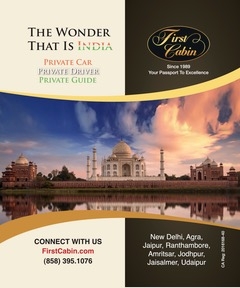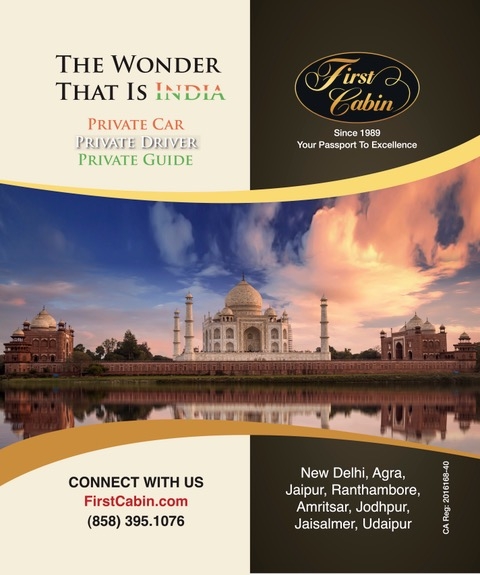India - The wonder that is india
India's history dates back to the dawn of civilization
8/24/2024
India, a land of incredible diversity and rich history, is a country that has fascinated the world for centuries. From its ancient civilizations to its modern-day economic prowess, India stands as a testament to the resilience and creativity of its people. This article delves into the multifaceted aspects of India, exploring its history, culture, and the reasons why it is a magnificent destination to travel.
India's history dates back to the dawn of civilization. The Indus Valley Civilization, one of the world's earliest urban cultures, flourished around 2500 BCE in what is now Pakistan and northwest India. This civilization laid the foundation for the subcontinent's rich cultural heritage, with advanced urban planning, trade networks, and artistic achievements. Over the millennia, India became a melting pot of cultures, religions, and empires. The Maurya and Gupta Empires, which ruled during the ancient period, are often referred to as the golden ages of India. The Mauryan Empire, under Emperor Ashoka, was particularly notable for its promotion of Buddhism and its spread across Asia.
The medieval period in India saw the rise of several powerful kingdoms and empires, including the Chola Dynasty in the south and the Mughal Empire in the north. The Mughals, in particular, left an indelible mark on Indian culture, architecture, and governance. Their legacy includes iconic structures like the Taj Mahal, one of the Seven Wonders of the World, and a symbol of India's rich artistic heritage.
India's history took a dramatic turn with the arrival of the British East India Company in the 17th century. Over time, the British established control over vast parts of the subcontinent, leading to the era known as the British Raj. This period was marked by both exploitation and modernization, as the British introduced railways, telegraphs, and a centralized administrative system. The struggle for independence from British rule was long and arduous, culminating in 1947 with the partition of India into two separate nations: India and Pakistan. The partition was a traumatic event, leading to massive displacement, communal violence, and the creation of new national identities.
The partition of India in 1947 was one of the most significant events in the subcontinent's history. It was the result of deep-seated religious and political tensions between Hindus and Muslims, exacerbated by British colonial policies. The creation of Pakistan, a separate nation for Muslims, led to the division of India along religious lines.
One of the most contentious outcomes of partition was the dispute over the region of Kashmir. Both India and Pakistan claimed the territory, leading to several wars and ongoing tensions. Kashmir remains a flashpoint in India-Pakistan relations, with its people caught in the crossfire of geopolitical struggles.
India is a land of religious diversity, with Hinduism and Islam being the two largest religions. Hinduism, the majority religion, has shaped much of India's cultural and social fabric. It is a complex faith with a vast array of deities, rituals, and philosophies. Islam, introduced to India through trade and conquest, has also played a significant role in shaping the country's history and culture. The Mughal Empire, with its Muslim rulers, brought Islamic art, architecture, and cultural practices to India. Despite occasional tensions, Hindus and Muslims have coexisted for centuries, contributing to India's rich cultural tapestry.
India is the second-most populous country in the world, with over 1.4 billion people. This vast population is incredibly diverse, with thousands of ethnic groups, languages, and cultures coexisting within its borders. India's demographic diversity is both a strength and a challenge, as the country strives to balance its ancient traditions with the demands of modernity.
The caste system is one of the most complex and enduring aspects of Indian society. Originating in ancient times, the caste system divides people into hierarchical groups based on their birth. Although the Indian Constitution officially abolished caste-based discrimination, caste continues to influence many aspects of life, including social interactions, marriage, and politics. Efforts to address caste-based inequalities have led to affirmative action policies, such as reservations in education and government jobs for historically marginalized communities. However, the legacy of caste remains a significant social issue in India.
Arranged marriages are a longstanding tradition in Indian society. Unlike in the West, where individuals often choose their own partners, in India, marriages are typically arranged by families. This practice is rooted in the belief that marriage is not just a union of two individuals but a joining of families and social networks. Arranged marriages in India are often guided by considerations of caste, religion, and socioeconomic status. While love marriages (where individuals choose their own partners) are becoming more common, arranged marriages remain prevalent, particularly in rural areas.
India is a land of festivals, with a calendar filled with vibrant and diverse celebrations. These festivals are a reflection of the country's religious diversity and cultural richness.
DiwaliDiwali, the festival of lights, is one of the most widely celebrated Hindu festivals. It marks the victory of light over darkness and good over evil. Homes are adorned with oil lamps, and firecrackers light up the night sky. Diwali is also a time for family gatherings, feasting, and the exchange of gifts.
EidEid, celebrated by Muslims, marks the end of Ramadan, the holy month of fasting. It is a time of prayer, charity, and communal feasts. Eid al-Fitr and Eid al-Adha are the two major Eid festivals in India, celebrated with great fervor by the Muslim community.
HoliHoli, the festival of colors, is another major Hindu festival. Celebrated with vibrant colors, music, and dance, Holi marks the arrival of spring and the victory of good over evil. It is a festival that transcends religious boundaries, with people from all communities joining in the revelry.
India is a linguistic treasure trove, with over 1,600 languages spoken across the country. The Constitution of India recognizes 22 official languages, including Hindi, Bengali, Telugu, Marathi, Tamil, and Urdu. Each language reflects the cultural identity of its speakers and contributes to India's rich linguistic diversity.








